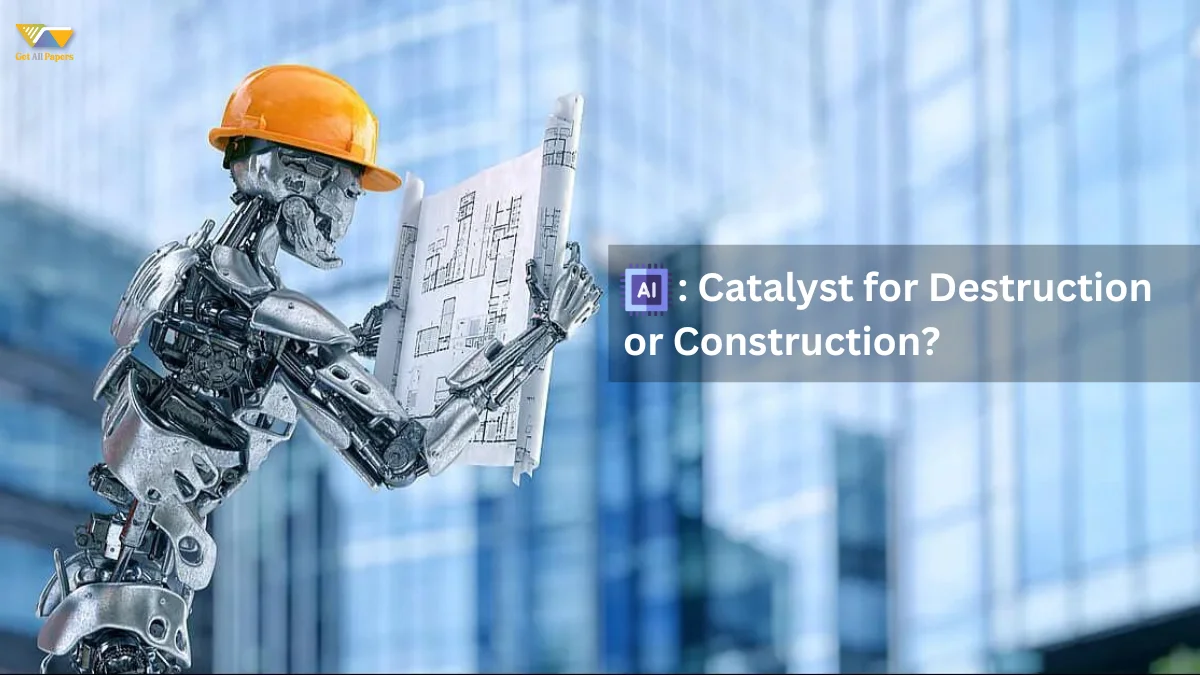
AI: Catalyst for Destruction or Construction?
Written By: Bessie B. Jackson
Published On: Aug 19,2023
Artificial Intelligence (AI) has emerged as one of the most transformative technological advancements of the modern era. Its capabilities range from enhancing productivity and efficiency to revolutionizing industries, making it an omnipresent force in today's world. However, the dual nature of AI raises a pivotal question: is AI a cause of destruction or construction? This essay delves into the multifaceted impact of AI, examining both its potential for constructive contributions and the concerns surrounding its potential for destructive consequences.
Construction Through Innovation:
AI has demonstrated its capacity for construction by driving innovation across various sectors. In healthcare, AI-powered diagnostic tools aid medical professionals in early disease detection and treatment planning. This not only saves lives but also reduces medical costs. Similarly, AI-driven advancements in agriculture optimize crop yields and resource allocation, addressing food security challenges. In education, personalized learning powered by AI enhances student engagement and comprehension. Moreover, automating repetitive tasks in industries boosts efficiency, freeing human resources for more creative and strategic roles.
AI's ability to process vast amounts of data quickly and accurately has led to significant breakthroughs in scientific research. For instance, AI accelerates drug discovery by simulating molecular interactions and predicting potential drug candidates. In climate science, AI assists in analyzing complex climate models, aiding researchers in understanding and mitigating the impacts of climate change. Thus, AI contributes constructively to human progress by expanding the frontiers of knowledge.
The Dark Clouds of Destruction:
Conversely, concerns about AI's potential for destruction revolve around ethical, social, and economic implications. The rapid automation of jobs could lead to widespread unemployment, exacerbating economic disparities and social instability. The ethical dilemma of AI systems making consequential decisions has sparked debates, as bias in algorithms can perpetuate social inequalities. Additionally, the integration of AI into military applications raises fears of autonomous weapons that could be difficult to control, potentially leading to unintended conflicts and mass casualties.
The proliferation of AI also raises privacy concerns, as personal data is collected and analyzed for various purposes. The misuse of such data could compromise individual privacy and security. Furthermore, the potential for AI to generate convincing DeepFake content raises questions about the authenticity of information in the digital age, undermining trust and further polarizing societies.
Finding Balance:
The trajectory of AI's impact depends on the choices humanity makes. Striking a balance between AI's construction and destruction requires ethical considerations, regulatory frameworks, and responsible innovation. Developing AI technologies that are transparent, fair, and accountable can help mitigate bias and ensure equitable outcomes. Governments and industries should collaborate to create policies that facilitate the reskilling and upskilling of the workforce, ensuring that the benefits of AI are distributed more equitably.
Education plays a pivotal role in preparing society for the AI-driven future. By nurturing critical thinking, ethical reasoning, and adaptability, education can empower individuals to harness AI for positive change while navigating its potential pitfalls. Incorporating interdisciplinary studies that combine AI with ethics, social sciences, and philosophy can foster a holistic understanding of AI's implications.
Conclusion:
In conclusion, AI is a dual-edged sword with the power to construct and destroy. Its potential to drive innovation, enhance efficiency, and contribute to various sectors is undeniable. However, its darker implications involving job displacement, ethical concerns, and potential for misuse cannot be ignored. The course of AI's impact rests on humanity's ability to harness its potential responsibly. By adopting ethical practices, robust regulations, and a commitment to ongoing education, society can ensure that AI remains a force for construction rather than destruction. Our collective responsibility is to steer AI toward a future that amplifies human progress while safeguarding our values and well-being.
To check out more about recent scenarios and ongoing situations in the world visit: getallpapers.com.
Related Posts
Popular Article

A guide to write a reflective essay
17.1.2023

Explain the tricks to write a biography
20.1.2023

Tips to writing a scientific thesis
27.1.2023




